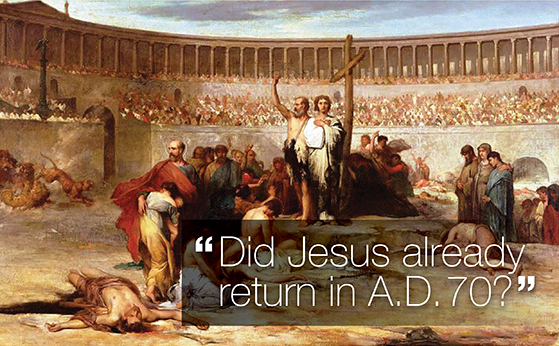From sex scandals, demonic doctrines, and song lyrics, to disturbing MTV, should Christians avoid Hillsong?
Did Jesus already return in A.D. 70?
Did Jesus already return in A.D. 70?
What are the dangers of partial preterism?
If you listen to partial preterists present their position it will not take long until they return to Matthew 24:34 as a foundation stone of their position:
Assuredly, I say to you, this generation will by no means pass away till all these things take place.”
Matthew 24:34 —New King James Version (NKJV)
Exactly what is preterism?
In brief—preterism is the Christian eschatological (understanding of end time events) belief that most of Bible prophecy has already been fulfilled including Jesus’ Matthew 24 Olivet Discourse and the majority of prophecies in the book of Revelation.
Note: Coffee Scribe takes a pre-tribulation view concerning end times. Teaching other views is not heresy as it is not pivotal to salvation. This article, like every other article written about end times, is subjective in nature—we all look at the same facts as recorded within Scripture, and then make our own assumptions regarding how we understand and interpret those facts. Because of this, I in no way can claim to be right about my viewpoint, as neither can anyone else regarding their viewpoint as well. This article is not intended for correction of any brother or sister in Christ who holds to a different viewpoint than mine. With this said, I hope you enjoy reading the article below and find encouragement in the Word of God whatever your view may be. God Bless. – Coffee Scribe
PREFACE: The pre-trib rapture teaching is not about not living your life and not walking it out in Christ’s authority and power. Believers are called to serve and to be the very best in expressing Christ to the fullest. We are never to be so heavenly focused that we miss our earthly callings and responsibilities. We are to go therefore and make disciples of all nations in Jesus’ name (Matthew 28:16-20)… to the very end of the age.
According to partial preterism1:
- Nero was the Antichrist [even though he never sat in God’s temple, nor was destroyed by Christ’s coming of any kind]. There will be no future individual Antichrist;
- The Tribulation Period is already over. It occurred when the Roman army besieged Jerusalem in A.D. 66 – 70;
- There is no rapture as Christ has already “returned” in the clouds in A.D. 70 to witness the destruction of Jerusalem by the Roman army;
- God replaced Old Testament Israel with the Church—therefore, all the Biblical promises to Israel belong to the Church, and not Israel;
- Armageddon already happened in A.D. 70. The fall of “Babylon” refers to the destruction of Jerusalem by the Romans;
- Satan is already bound in the abyss and cannot hinder the spread of the Gospel—therefore, Revelation 20 has already been fulfilled;
- We are already in the Millennium, but it is not literal. Some preterists equate the entire Church Age as the Millennium. The 1,000 years are not literal but figurative, (even though they are mentioned six times in Revelation 19-20).
Credit:
1. The seven points above are from Dr. Thomas Ice’s website at according2prophecy.org.
So what’s the problem?
Does any of this really matter?
Yes, it does—here are five2 practical Implications of a partial preterist interpretation, and why it’s a big problem:
1. It destroys the literal meaning of the Bible
Once you start arguing that the language of prophecy cannot be taken literally, you are not that far removed from not taking the rest of the Bible literally either. Preterists are following the dangerous path of liberalism which began denying predictive prophecy and soon rejected the literal interpretation of creation, the flood, the virgin birth of Christ, His vicarious death and bodily resurrection.
2. It distorts the promise of the Second Coming
Placing the return of Christ in the past robs the Church of a confident expectation about the future. We are left on earth trying to “make the best of it” without any real hope of divine intervention. It leaves the Church trying to “bring in the Kingdom” without the King.
3. It diminishes the hope of the believer
Preterism negates the Biblical commands to “watch” and “be ready” for the coming of Christ. It limits those injunctions to the first-century believers prior to A.D. 70. In fact, it limits every Biblical command related to the return of Christ. The phrase “until He comes” would have to be limited to A.D. 70. How can we “build the church” (Matthew 16:18) or “occupy until he comes.” In fact, how do we celebrate the communion service to “show forth the Lord’s death until he comes” (I Corinthians 11:26)? Should we stop celebrating the Lord’s Supper because He already came in A.D. 70?
4. It deprives Israel of her future
Preterists insist that God is finished with Israel. Many of them teach that it is actually Jesus who breaks the covenant with Israel in Daniel 9:26-27. In essence, preterism pits Jesus against Israel and therefore smacks of anti-Semitism. Preterists actually teach that the “Babylon” of Revelation 17-18 is Jerusalem! Therefore, the fall of Jerusalem in A.D. 70 represents Christ’s ultimate triumph over unbelief.
5. It denies the power of Christ
While most preterists would insist they are defending the power of Christ, they are actually denying it. They are trying to “bring in the Kingdom” without the King… God will continue to do marvelous things in this world. But the Church will never bring the Kingdom of Heaven to earth until the King of Heaven returns in person.
Credit:
2. The five points above are from an article which appeared in the May 2005 issue of Jerry Falwells’ The National Liberty Journal by Dr. Ed Hindson.
Concerning an A.D. 70 fulfillment
One of the main problems (even though there are several) is with an A.D. 70 interpretation of the Olivet Discourse is Jesus’ statement that this gospel of the kingdom would be preached in all the world as a witness to all the nations.
When was this done before A.D. 70? Did Jesus not know about the nations in the Americas, Asia, Africa, Australia? The preterist claims that the known world at that time which was primarily the Roman Empire, including the region of Israel was what made up the “whole” world. Did Jesus not intend for the entire world at large to have a witness? And if this was accomplished, then is the Great Commission completed? Are we done with our work? When Jesus said to go into all the world and preach the gospel, is the “world” there to be interpreted the same as the preterists do for “world” in Matthew 24? And if not, why should we interpret one statement concerning preaching the gospel to the world differently than another statement? This is where one’s theological position begins to drive one’s interpretation, rather than letting the words of Scripture drive interpretation.
You can’t have it both ways
In order to be consistent with the view of “this generation” meaning the generation Jesus was speaking to at that time, preterists must also be committed to the fact that “all these things” must occur before “this generation” passes away then.
Matthew 24:34 – (NKJV)
34 “Assuredly, I say to you, this generation will by no means pass away till all these things take place.”
Jesus is very clear that “all these things” must happen until “this generation” can pass away. What are “all these things?”
All these things…
“All these things” are the things seen between verses 15 and 33 in Matthew’s gospel. When we survey the list of events considered within “all these things” we have to especially wrestle with verses 27-31. In order to interpret Matthew 24 consistently, there is simply no way around the fact that verses 27-31 describe the return of Jesus in an apocalyptic scenario. Where most preterists (as well as myself and many other Christians) have an issue is due to the absolutely ridiculous depictions of End Times events such as portrayed in the Left Behind books and movie series. They have done the worst possible job ever in presenting actual Biblical truth—not only was the story complete garbage and a total joke—the acting sucked and was terrible! Sadly enough, if it wasn’t so lame, it actually would be laughable.
Matthew 24:29-31 – (NKJV)
29 “Immediately after the tribulation of those days the sun will be darkened, and the moon will not give its light; the stars will fall from heaven, and the powers of the heavens will be shaken. 30 Then the sign of the Son of Man will appear in heaven, and then all the tribes of the earth will mourn, and they will see the Son of Man coming on the clouds of heaven with power and great glory. 31 And He will send His angels with a great sound of a trumpet, and they will gather together His elect from the four winds, from one end of heaven to the other.”
The text clearly describes a globally visible return of Jesus to resolve a Jerusalem-centric crisis that begins with unparalleled tribulation and an abomination (Matthew 24:15-26). This is abundantly clear when we examine a few of the passages Jesus quotes in this section. In Matthew 24:30, Jesus quotes Zechariah 12:10-11 from the Septuagint prophesying a day when the eyes of Israel will be opened and they will recognize who He is and begin mourning in pain because of their rejection of Him. It will be a time when Israel will receive both grace and a spirit of supplication to cry out to Jesus.
Of course, it is clear that this did not happen in A.D. 70
The mourning in Israel in A.D. 70 was of a completely different nature. The people were in mourning, but not mourning related to the recognition of Jesus as God’s own Son, their rejection of Him, and their ultimate reconciliation to Him.
Did Israel call on the Lord in A.D. 70 with the Roman armies surrounding them? No. The preterist says they didn’t see him. That would mean he didn’t come as he said he would.
The Bible teaches that before Israel can receive the cleansing of her sin before Christ will return to establish His Kingdom—the nation Israel must first look to the One whom they have pierced and plead for His return. When this is done they will they receive their cleansing. The cleansing of Israel’s sin is connected to the Second Coming. The one condition—they must repent and call on him!
The nation Israel did not recognize Jesus and instead became more and more resistant to Him. Jesus also summarizes Isaiah’s prophecy in Isaiah 27:13 of a final trumpet blast and a final regathering of Israel unto the worship of YHWH (the LORD) in Jerusalem. Therefore if “all these things” happened in A.D. 70, then that means the final great trumpet and regathering of Isaiah 27 also occurred in this time.
So we know, at the least, “all these things” has to include the globally visible return of Jesus (The Second Coming of Christ), the final regathering of the Jews from the nations (Assyria and Egypt specifically), YHWH receiving pure worship from the Jews in Jerusalem, and the resurrection of the dead. In other words, because Jesus is building on a consistent eschatology, all the eschatological events that are implicated in His summarization of Old Testament eschatology in Matthew 24 must have their fulfillment before “this generation” passes away.
A slippery slope…
Once you start arguing that the language of prophecy cannot be taken literally, you are not that far removed from not taking the rest of the Bible literally either as the problems continue, such as the following:
a) previous prophetic fulfillments
In Bible prophecy, there can be both a near-team and a far-term fulfillment of a given prophecy. The near-team fulfillment is usually a small, partial fulfillment of what the intended outcome is to be: I believe that there is ultimately only one main fulfillment of each prophecy; however, often there are similar or like prophecies that foreshadow that main fulfillment. Even the Jewish sages who’ve been studying the Old Testament scriptures for millennia recognize the often cyclical nature of some prophecies in that many have a kind of “multiple” / foreshadowing type of fulfillment. It seems that the preterist looks at prophecy in more a linear (timeline) Greco-Roman perspective rather from the Hebraic, more cyclical nature in which the Bible was written.
This is to their detriment and causes them to have a skewed view of Biblical prophecy.
Preterism and why it should matter
- It destroys the literal meaning of the Bible
- It distorts the promise of the Second Coming
- It diminishes the hope of the believer
- It deprives Israel of her future
- It denies the power of Christ
Example 1
of a prophetic foreshadowing
“Abomination of Desolation” spoken about in Matthew 24:15
of which quotes Daniel 9:27:
In 167 B.C. a Greek ruler by the name of Antiochus Epiphanies set up an altar to Zeus over the altar of burnt offerings in the Jewish temple in Jerusalem. He also sacrificed a pig on the altar in the Temple in Jerusalem. This event is known as the abomination of desolation. This previous “foreshadowing” is of a yet future fulfillment when the Antichrist will fulfill Daniel 9:27.
Example 2
of a prophetic foreshadowing
The Second Coming of Jesus Christ:
There will be two phases to the Second Coming, rather than two physical comings. First—Christ comes in the air to meet the raptured saints (i.e., to take out Christian believers who are alive at the time). This event is called the Rapture. Second—Christ comes to Earth at the Battle of Armageddon, and subsequently sets foot on the Mount of Olives in Israel. Christ’s return will be an event that is seen all over the world. This second event is called the “Second Coming.” Preterists often complain that dispensationalists have two “Second Comings,” and that at least a seven or more year separation between the Rapture and the Second Coming is not in the Bible. However, note that even preterists believe in two phases: one in A.D. 70 (i.e., a “coming” in judgment upon Israel/Jerusalem), and a future appearance—therefore, preterists have an even wider separation of years (A.D. 70 to now) between the two phases than dispensationalists do (i.e., seven or more years).
b) some prophecies already fulfilled while not recognizing others
Preterists do not recognize certain historical occurrences such as the Balfour Declaration as a fulfillment of prophecy
Moderate or partial preterists believe that God is finished with Biblical Israel. They see no prophetic future for national Israel. The fact that the State of Israel exists today is blamed on an “accident of history” perpetrated by “ignorant premillennialists” who supported the Balfour Declaration that eventually led to the formation of the modern state of Israel in 1948.
The first-century history does not even mention the Lord’s return, a bodily resurrection, a Day of Judgment, nor the universe renovated
- Why silence for a long list of events that individually were greater than the city falling?
- Preterists declare loudly how God raised up Josephus to confirm Jerusalem’s destruction. They will use the historian Eusebius to confirm that many saints left Jerusalem for Pella—while ignoring the total silence from John, Polycarp, Irenaeus, Clement of Rome, Eusebius, and others during and shortly after that time!
- How could the early disciples and fathers entirely miss the facts that Jesus had returned as promised? That they and their teachers had been resurrected and judged? That they were living in the new heavens and earth? That they were now free of Satan and sin?
c) misunderstanding of history
Some preterists fail to fully understand historical events. The preterist view of the Olivet Discourse in Matthew 24 is a prime example. While it appears that some of the things Jesus predicted in Matthew 24 have an A.D. 70 fulfillment, other events listed in this chapter clearly do not unless you “cram it to fit and paint it to match” as preterists like to do. This they do by applying some things in a given prophecy in a literal sense, and then when a prophecy can’t be interpreted literally to fit historical events, they simply allegorize it away by making the prophecy symbolic.
Example 3
of an allegory or symbolic interpretation (of which obviously has not happened)
Jesus drinking of the fruit of the vine:
Matthew 26:29 says: “But I say to you, I will not drink of this fruit of the vine from now on until that day when I drink it new with you in My Father’s kingdom.”
Jesus physically drank the wine with his disciples—where is Jesus drinking this with us on earth? If this has not in fact happened yet, then we must honestly admit that the Fathers kingdom has not yet come in the way that it has been symbolically interpreted to have already come by the preterists.
Even when symbolism is used in the Bible for prophecy it is always fulfilled literally, not allegorically. A literal Jesus was born to a literal virgin in the actual town of Bethlehem. He literally died and paid for the sins of humanity with literal blood; and he literally rose in a physical body—exactly as prophesied. If not, then nothing means what it says in the Scripture. You do not pick and paste portions to make something out of nothing. Bible prophecy is literal, specific not vague but accurate.
Symbolism versus actualism used in prophetic speech
One can make the Bible say virtually anything they want it to say when not making the proper distinction between symbolism and actualism. This is a dangerous approach and sloppy hermeneutics (the art and science of interpreting written texts) where they make the Bible say what they want it to say (eisegesis) instead of letting the Bible speak for itself (exegesis).
Old Testament passages referring to the day of the LORD often speak of both a near and a far fulfillment, as does much of Old Testament prophecy. Some Old Testament passages that refer to the day of the LORD describe historical judgments that have already been fulfilled in some sense (Isaiah 13:6-22; Ezekiel 30:2-19; Joel 1:15, 3:14; Amos 5:18-20; Zephaniah 1:14-18), while others refer to divine judgments that will take place toward the end of the age (Joel 2:30-32; Zechariah 14:1; Malachi 4:1, 5). Both use symbolism to speak of actual reality. Most people who understand the use of proper hermeneutics in prophetic speech are familiar with this style of writing and know how the two work perfectly together. To dismiss the timing of a passage or the event itself due to its use of symbolic descriptions is not proper hermeneutics and does not justify eliminating that passage’s meaning and the message just because the descriptive speech was used.
Example 4
the symbolism used to describe the Day of the LORD
Used both in the Old Testament and the New Testament – (see Scriptures listed above):
“The Day of the LORD” is a Biblical term and theme used in both the Hebrew Bible (Old Testament; and the New Testament, as in “The sun shall be turned into darkness, and the moon into blood, before the great and the terrible day of the LORD come” (Joel 2:31, cited in Acts 2:20).
d) erosion of types of shadows pointing to Messiah (Christ)
The preterist usually fails to understand Israel in history—to do so completely erode the prophetic foreshadowing types of symbolism pointing to the Messiah. Messiah’s marriage to a Gentile bride (the Church)—referring to “the marriage supper of the lamb,” which includes the basis for taking the cup of Holy Communion as the “bride of Christ” reenacting the symbolism of the ancient Jewish wedding feast; and multiple Old Testament stories and New Testament parables, no longer fit their metaphors, types, and foreshadowing which all point to Messiah and our, the Church’s relationship with Him as His betrothed bride and He our bridegroom.
e) disregard of Israel’s role in eschatology
How can we take all scriptural reference to the Jews and to greater Israel and be so subjective and ego-centric as to apply them exclusively to the Gentile Church? While I disagree with partial preterism—I disagree respectfully as a brother, not as an opponent. The Jews (Israel) have not been replaced by the Church—to do so, could even be considered as an anti-semitic philosophy! (Some believers even say that this almost makes it a doctrine of demons.) With this last point, consider the “why” behind those who are driven to eliminate Israel and her place in eschatology. The Arab nations want to “blow Israel off the face of the map;” Seventh-Day Adventists (SDAs) and other cults do not recognize Israel—because the enemy of God Himself, Satan does not recognize her and has a need to completely destroy her and eliminate her as well. Without Israel, there is no complete fulfillment of the Scripture, and YHWH would have broken His Abrahamic Covenant with Israel (Genesis 13:14-15).
Israel is back in their land! – the Balfour Declaration
One has to willfully convince himself or herself into denial to come to a conclusion that the prophecies concerning Israel have already been fulfilled, and the LORD has no more use for the nation and people of Israel in eschatology.
According to Scripture, Matthew 23:35 tells us that Israel was made desolate in A.D. 70 as they were either killed, captured or fled. However, Scripture makes it clear they will be back in the land when they call upon the LORD to defend them and save them (Joel 2:30-32; 3:1,16-17; Zech. 12:10). God has promised to bring them back where they will be saved and enjoy the land in peace—which takes place in the millennial reign of Jesus Christ.
It makes God a liar and laid the basis for Christian anti-semitism. The “70 Weeks”
deal specifically with Israel.”
– Dr. Chuck Missler
What is the end result of a preterist view?
Without an actual Israel (not a replacement of her), there cannot be numerous prophetic fulfillments as the Bible indicates.
Replacement Theology
The fact that Israel rejected Jesus as the Messiah resulting in their worldwide dispersion, has led to a great satanic deception which has invaded the Christian Church with many teaching that God’s covenant with Israel no longer exists. This is known as Replacement Theology—the view that the church is the new or true Israel that has permanently replaced or superseded Israel as the people of God. The theory is that because Israel rejected Christ as the Messiah (Romans 9), God took His promises from the Jews and gave them to the Gentiles. It is true that God brought salvation to the Gentiles due to the stumble of the Jews, “I say then, have they stumbled that they should fall? Certainly not! But through their fall, to provoke them to jealousy, salvation has come to the Gentiles.” – Romans 11:11
The preceding scripture makes it clear that God did not cast away the Jewish nation and replace them with the Gentiles, often referred to as the Church. Apostle Paul stated that Gentiles who accept Christ are “grafted” spiritually into the Jewish nation and become a part of God’s chosen people (Romans 11:11-36). The Church was grafted into God’s chosen people but never replaced Israel.
“Many nations shall be joined to the LORD in that day, and they shall become My people. And I will dwell in your midst. Then you will know that the LORD of hosts has sent Me to you.” – Zechariah 2:11
Non-Jews can find great joy in knowing that all who accept Christ will be joined with the “apple of God’s eye.” Apostle Paul also stated the order in which salvation comes to the world, “For I am not ashamed of the gospel of Christ, for it is the power of God to salvation for everyone who believes, for the Jew first and also for the Greek.” – Romans 1:16
As God is always true to His word, the Jews have returned to physical Israel and the Jewish nation was officially reborn on May 14, 1948. One would think this event would have erased all thoughts of Replacement Theology. The physical restoration is occurring today but the spiritual restoration is still to come. The spiritual restoration will come about as a result of the worst persecution that Israel will ever face. Replacement Theology has led to the Church abandoning Israel even though the entire world is coming against it, led by forces of evil.
“And it shall come to pass in all the land, says the LORD, that two-thirds in it shall be cut off and die, but one-third shall be left in it: I will bring the one-third through the fire, will refine them as silver is refined, and test them as gold is tested. They will call on My name, and I will answer them. I will say, This is My people; and each one will say, The LORD is my God.” – Zechariah 13:8-9
While I disagree with partial preterism—I disagree respectfully as a brother, not as an opponent. The Jews (Israel) have not been replaced by the Church—to do so, could even be considered as an anti-semitic philosophy.”
We learn that the ancient church fathers not only told us about a pre-trib rapture, but also about a seven-year tribulation period, and where the antichrist would be born and who some of the ten nations are. They also predicted the rise of Islam and explained how these things fit together in the end times.





Comments (0)